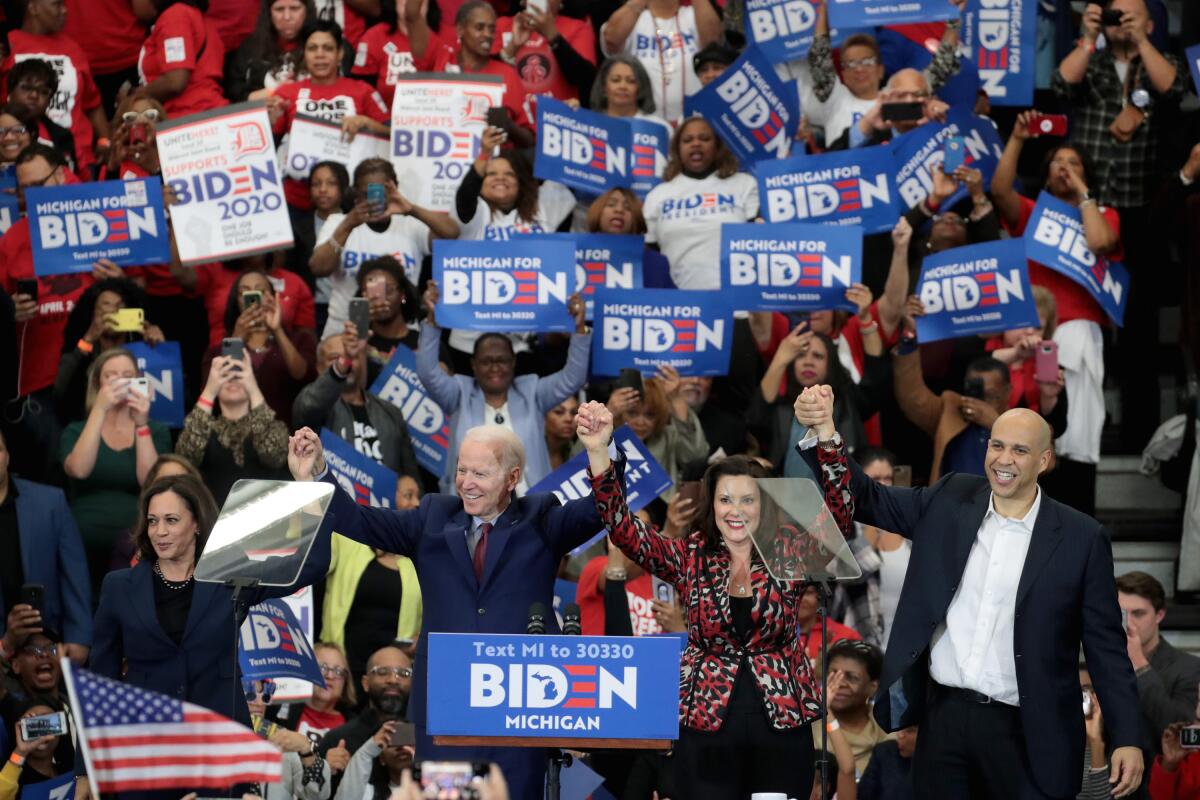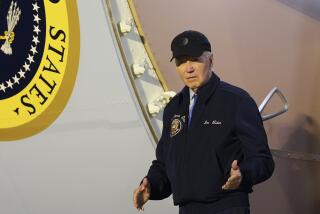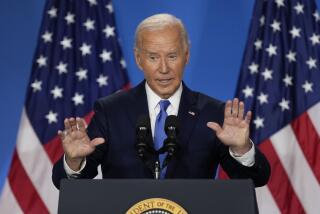Will coronavirus make Americans long for normalcy? Joe Biden hopes so

- Share via
WASHINGTON — Will coronavirus make Joe Biden president?
When he launched his presidential campaign 10 months ago, Biden cast himself as a sober, seasoned antidote to the disruptive politics and chaotic style of Donald Trump.
Biden’s campaign has relied on two underlying messages: a claim that he’s the Democrat best able to defeat Trump and a promise to restore an older, more conciliatory brand of politics.
“We need plain, basic decency,” he says.
He has promised, in effect, to Make America Normal Again.
Biden deployed that message not only against President Trump, but also to contrast with his strongest Democratic rival, Sen. Bernie Sanders.
“Americans aren’t looking for revolution,” Biden said last month. “They’re looking for a more practical path.”
At first, it wasn’t clear that those themes were what Democratic voters wanted. The rap against Biden was that he was incurably nostalgic, anachronistic, even out of touch — as when he claimed Republicans would experience “an epiphany” and revert to bipartisanship once Trump was exorcised.
But after a series of flirtations with newer, more exciting candidates, most Democratic voters appear to be returning to the well-worn, reassuring Biden.
One reason is that after a series of decisive primaries he has finally won the electability argument. A CNN Poll released this week found that 66% of Democratic voters saw Biden as the candidate with the best chance of defeating Trump, against 26% for Sanders. The poll suggested that some voters who prefer Sanders’ policy positions had decided to vote for Biden instead, on grounds of electability. (Call them “Bernie-Biden voters.”)
The CNN poll also showed a second reason for Biden’s surge: Asked which candidate “would best handle a major crisis,” 65% of Democrats named Biden, 23% Sanders.
That could be an important factor in November. Crisis management is on voters’ minds and will remain there as long as the coronavirus epidemic and its impact on the economy persist.
Trump’s response to the crisis has been noisy, self-congratulatory and confusing.
“Our coronavirus team has been doing a great job,” he tweeted on Tuesday.
“It will go away; just stay calm,” he told reporters, referring to the epidemic.
Biden has seized the opportunity to renew his role as the anti-Trump.
“I wish he would just be quiet,” Biden said. “Just let the experts speak.”
Trump didn’t take his advice.
It’s too early, of course, to know what effect the coronavirus will have on an election that’s almost eight months away. (And as a technical matter, Biden doesn’t have his party’s nomination yet.)
We don’t know how bad the epidemic will be or how long it will last. We don’t know whether the economy will recover quickly or slide into recession.
We do know that voters — all except the most partisan ones — often judge presidents on how well they manage crises. George W. Bush’s public standing tumbled after his administration mismanaged relief efforts in New Orleans after Hurricane Katrina in 2005. Barack Obama’s fortunes sagged after the bungled rollout of his healthcare plan in 2013.
Trump doesn’t deserve blame for the coronavirus, or even for its entry into the United States, which he tried but failed to prevent.
But he surely deserves to be held accountable for his administration’s management of the ensuing crisis, just as Bush and Obama were.
As the epidemic spreads, voters are unlikely to forget that Trump spent weeks insisting that he had it under control. (He didn’t.) Or that he insisted testing was available for everyone who needed it. (It isn’t.) Or that he claimed the virus would “magically” disappear in April. (It may die down, but it may also come back.)
And if the economy takes a serious hit, voters will likely hold that against him, too — just as they have given him credit, deserved or not, for the economy’s strength.
A president who trumpeted stock market advances as evidence of his brilliance may have a hard time pinning responsibility for a market slump on other countries – although Trump is trying.
Voters pay attention to a president’s leadership in a crisis — his grasp of the issues, his steadiness, his ability to manage unexpected circumstances. So far, Trump is failing those tests.
Trump won the presidency as an outsider who promised to shake things up. After three years of disruption, voters may be yearning for an insider who can make things work.
Even if it’s Joe Biden, who gives voters the option of what investors call a flight to safety — boring but safe.
If coronavirus has made voters yearn for a respite from disruption, Biden’s chances of winning in November have improved.
He wasn’t every voter’s first choice, to be sure. But this may be a year when voters consider “unexciting” a virtue.
More to Read
Get the L.A. Times Politics newsletter
Deeply reported insights into legislation, politics and policy from Sacramento, Washington and beyond. In your inbox three times per week.
You may occasionally receive promotional content from the Los Angeles Times.











